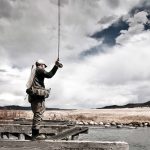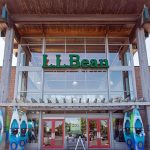BOSS: How has the industry changed Since OIA has formed?
In 2000, Frank moved into the role of association president after serving as an industry-elected board director. He is a co-founder and board director of The Outdoor Foundation, board director of the Northern Forest Canoe Trail, served on the National Coalition for Promoting Physical Activity, and served on The National Forum on Children and Nature co-chaired by the U.S. Secretary of Interior and author Richard Louv.
Frank lives in Boulder, Colorado and has climbed, hiked and skied extensively in the mountains of North America and Europe. He now spends most of his free time introducing his son Cole to the joys of camping, hiking, paddling, fly-fishing and skiing.

FH: I think from the association standpoint the most important milestone over the last 20 years was the re-branding and repositioning of OIA and the industry as an economically important and clearly defined business trade group. The next significant milestone that occurred was the use of that clout during the situation in Utah with the proposed sale of oil and gas leases. It helped us hone our message with then-Governor Leavitt and the threat of moving the [OR] show because it showed, 1) We had clout and; 2) We could clearly define how we could use it.
Another key milestone was achieved just a couple of years ago with the new partnership with Nielsen Business Media and the Outdoor Retailer Show.
Lastly, I would say the formation of the Outdoor Industry Foundation was another major milestone. It's now truly impacting the future of young Americans. At the highest levels, it's working with the Administration alongside our government affairs staff and all the other major foundations across the country in growing the next generation of outdoor enthusiasts. We're going to look back at the formation of the outdoor foundation as one of those major milestones.
FH: When I talk about re-branding and repositioning in the outdoor industry, the result of that has been dramatically accelerated and [has] increased clout in Washington. We are now a national leader on public land policies and international trade issues – and that wasn't the case as little as five years ago. So, in a twenty year period we are leaps and bounds ahead compared to where we were. We're an emerging and exiting voice for sustainable business practices and we're seeing that on the compliance side and the regulatory side where we're being asked to advise at the highest levels and so this newfound voice has opened doors and allowed us to walk through those doors in ways we were not able to envision ten years ago.
BOSS: What are your near-term goals?
FH: Our core purpose is to ensure the growth and success of the outdoor industry and that's why we do this. But we really want to be recognized as the association that inspires the world to love, preserve and play in the outdoors. And so we need to make sure we have a vibrant and diverse and innovative industry that's low in trade barriers and strong in revenues and profits.
We want to be a global leader in sustainable and fair business practices where our members strive to be responsible to ensure we're doing the right things. And you're going to see us building programs to ensure that that “Envisioned Future” happens. We are planning to continue to be passionate stewards of the land in which we play and we'll continue that work. But one of the major initiatives we're looking at is becoming a cornerstone of the coalition that's responsible for creating a unified, abundant and sustainable outdoor recreation infrastructure for future generations.
We're working with the Secretary of the Interior right now to frame out that vision and we're hopeful that it will become a major plank of the current Administration. And that includes close to home and in urban areas – a park within 10 minutes of every child in America so they feel comfortable outside and want to be outdoors. We feel it's an important goal for us. And then we plan to promote outdoor activities that are widely available. People of any age, any means, ethnicity or culture will prefer outdoor activities versus indoor activities and they're more active and healthier as a result.
FH: You have globalization occurring very rapidly that was having a major impact on the industry at the time. You had the communications and technology evolutions and other innovations that we still haven't seen the full impact on our industry yet. At the same time, we had massive amounts of mergers and acquisitions within the industry that were fueling growth and maturation and changing the industry landscape forever. We had urbanization taking a leadership role in framing how the industry will look now and forever with the face of both diversity as well as the different activities that consumers are going to be looking at. Many of these are going to continue to impact the industry. They're going to shape how we look into the future. Those are the big ones.
FH: Technology and the innovations impacting technology are going to continue to dramatically shape the industry – particularly when you look at how social media and the way America and the world is going to communicate with itself [and] is going to change how we market. It's going to change the consumer relationship in ways we dont understand yet. I think that sustainability and climate change is going to have a major impact on our industry. It impacts our activities but it's going to change the way that we do business over the next 20 years. We will find ourselves in a whole new paradigm and an exciting one going forward.
I truly feel urbanization is going to impact our industry. We have not fully addressed the issue of diversity within our industry. Urbanization is going to force those cultural shifts because that's where the majority of the American public is going to live.
From a global standpoint, there's many new emerging international markets and they are going to impact us both from a development and sourcing standpoint as well as creating a new middle class around the world that will become a whole new market for many of our companies.
We as an industry need to be in the best position to adapt, evolve and innovate in those new business paradigms. And that's fun. That's good work.
We are a vibrant, diverse and innovative industry, low in trade barriers and strong in revenues and profits. We are global leaders in sustainable and fair business practices and our members strive to be responsible corporate citizens where doing the right thing is the norm.
We are passionate stewards of the lands in which we play and a cornerstone of the coalition responsible for creating a unified, abundant and sustainable outdoor recreation infrastructure for future generations.
We promote outdoor activities that are widely available. People of all ages, means, ethnicities and cultures prefer outdoor versus indoor activities and are more active and healthier as a result.
The OIA board of directors recently approved the above statement to describe what OIA will look like in 15 years. The association has laid the foundation for that future and the current and future leaders that guide the organization have pledge to continue that mission.
B.O.S.S. Goes One-On-One with OIA’s Frank Hugelmeyer
Frank Hugelmeyer is a 22-year outdoor industry veteran with extensive experience in global retail, distribution and manufacturing. Prior to OIA, he directed North American sales and marketing for Lowe Alpine Holdings, a worldwide manufacturer of technical backpacks and outdoor apparel. Before Lowe, he led global sales and marketing for Bodyguard Fitness, a subsidiary of AB Aritmos. He began his industry career at Paragon Sporting Goods in New York City.
BOSS: What do you feel are the most significant OIA milestones over the first 20 years?
BOSS: How is OIA making an impact with its lobbying efforts in Washington?
BOSS: So talk about the next 20 YEARS. What does it look like?















